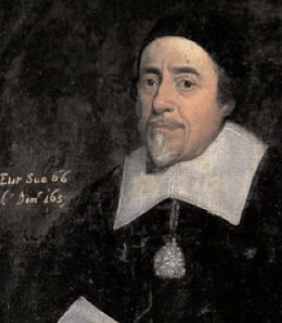Nathaniel Bacon (English politician) facts for kids
Nathaniel Bacon (born December 12, 1593 – died 1660) was an English lawyer, writer, and politician. He was a Puritan, which was a group of Christians who wanted to make the Church of England simpler. Bacon served in the House of Commons, which is like a part of today's Parliament, at different times between 1645 and 1660. He also worked as a judge for sea-related cases from 1653 to 1654.
Contents
Who Was Nathaniel Bacon?
Nathaniel Bacon was the son of Sir Edward Bacon. His grandfather was Sir Nicholas Bacon, who was a very important official to Queen Elizabeth I. Nathaniel studied at Christ's College, Cambridge, a famous university. In 1617, he became a lawyer.
Bacon's Role in Politics
Bacon was a Parliamentarian. This means he supported the Parliament during the English Civil War, not the King. He was very active in helping the New Model Army, which was Parliament's main army, starting in 1644.
In 1645, Bacon became a Member of Parliament for Cambridge University. He served in the Long Parliament, but he was later removed after an event called Pride's Purge.
Later, in 1654, Bacon was chosen as a Member of Parliament for Ipswich. His brother, Francis Bacon, was also an MP for Ipswich. They both represented Ipswich until Nathaniel's death. Besides being an MP, he also worked as a judge for sea law and helped with official requests.
What Did Nathaniel Bacon Write?
Nathaniel Bacon was also a writer. He wrote several important books about history and other topics.
The Fearefull Estate of Francis Spira (1638)
One of Bacon's early works was The Fearefull Estate of Francis Spira. In this book, he wrote a famous line:
- Man knows the beginning of sin, but who bounds the issues thereof?
This quote was later mentioned by John Bunyan in his book Grace Abounding. Bunyan mistakenly thought the quote was from Francesco Spiera, but it was actually Bacon's own words.
An Historical Discourse (1647–1651)
Bacon's book, An Historical Discourse of the Uniformity of the Government of England, is very important. It was one of the first history books about Norman England that used many different sources. It is known for arguing that English people had special freedoms from Anglo-Saxon times.
Bacon believed that the Anglo-Saxons were a free people who made their own laws. He also thought that William the Conqueror continued the rule of earlier kings. This book was seen as a strong statement about English liberties. It also showed a preference for government by an elected council, rather than a king.
The Annals of Ipswich (1654)
Another important work by Bacon was The Annals of Ipswich. This book is a major contribution to the history of the town of Ipswich. It shows that Bacon was a very skilled historian.
Nathaniel Bacon's Family Life
Nathaniel Bacon was married two times. His first wife was Elizabeth. They did not have any children. His second wife was Susan. With Susan, he had four sons and five daughters. As mentioned, his brother was Francis Bacon, who also served as an MP for Ipswich.
 | Frances Mary Albrier |
 | Whitney Young |
 | Muhammad Ali |


